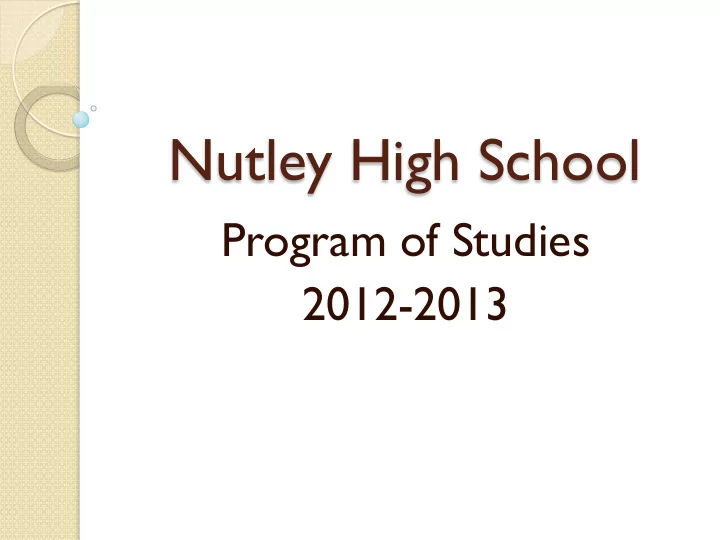

Nutley High School Program of Studies 2012-2013
Philosophy Helps students navigate through many facets of high school Outlines graduation requirements T ool to make scheduling decisions
Graduation Requirements T wo ways to complete requirements for graduation ◦ Traditional 120-credit program Students take all credits required for graduation by attending classes ◦ Option ii Students obtain graduation requirements through traditional coursework in the high school as well as coursework through other programs Pre-approval required
Advanced Placement (AP) Program Students who wish to take AP classes must: ◦ Meet the required prerequisites ◦ Complete the AP Recommendation Form ◦ Interview with the AP teacher – to ensure the student understands the expectations for the course
Advanced Placement (AP) Program 2011-2012 School Year ◦ Students who take an AP class are strongly encouraged to sit for the AP exam in May 2012-2013 School Year ◦ Students who take an AP course will be strongly encouraged to sit for the AP exam in May ◦ Students who take the AP exam will not be required to sit for the final exam in the course (this will be the only final exam exemption) ◦ Students who choose not to take the AP exam must sit for the final exam for the course, the final exam will count towards the student’s final grade
Scheduling Parameters Course Levels Level or Course Changes Withdrawals Audits
Grading Parameters Course Weighting ◦ Unweighted ◦ Weighted ◦ Advanced Placement and Honors Grading Scale Rank in Class
Grading Parameters
National Honor Society Weighted GPA of 3.7 School Service Activities ◦ Juniors – must participate in at least six (6) school service activities by the middle of junior year ◦ Seniors – must participate in at least eight (8) school service activities by the middle of senior year Community Service ◦ Juniors – Twenty-Four (24) hours of community service ◦ Seniors – Thirty-two (32) hours of community service ◦ Completed by March Induction into this organization takes place in the spring
Athletic/Extra-Curricular Activities Students must be meeting minimum credit requirements to be eligible to participate in athletic and extra-curricular activities
Cut Procedures – Full-Year Course 1st occurrence ◦ Written parental notification ◦ All work missed will result in 0 grade for that day ◦ Guidance notification ◦ Three-day central detention 2nd occurrence ◦ Parental phone conference required ◦ All work missed will result in a 0 grade for that day ◦ Guidance intervention ◦ One day In-School-Suspension ◦ Loss of extra-curricular activities for two weeks (including but not limited to athletic activities, dances, prom, clubs, etc.)
Cut Procedures – Full-Year Course 3rd occurrence ◦ Mandatory parent conference ◦ All work missed will result in a 0 grade for that day ◦ Two days In-School-Suspension ◦ Guidance intervention ◦ Loss of extra-curricular activities for four weeks (including but not limited to athletic activities, dances, prom, clubs, etc.) 4th occurrence ◦ Mandatory student/parent/administrator conference ◦ Three Days In-School-Suspension ◦ Loss of extra-curricular activities for remainder of the year (including but not limited to athletic activities, dances, prom, clubs, etc.) ◦ The student will be denied credit for the course ◦ Notification will be sent by certified mail to the parent/guardian informing them of the student's loss of credit ◦ Student will receive a grade of WF for the course
Honor Code Striving for academic excellence is dependent upon each student’s commitment to academic integrity Faculty guides the academic growth, while the parents and greater community provide support Academic Honor Code Pledge Form ◦ For all students ◦ Pledge that their work is original
Business Education Department Career and T echnical Education Department Visual Arts Department George Ackerman
Music Department Michael Cundari
Science Department Kent Bania Provides a strong correlation between regular education and special education courses Provides a clear understanding of fulfillment of the science requirements for graduation (Components A, B, and C) Establishes the description and requirements of classes in a central location for students, parents, and faculty Provides information on advanced placement class requirements, project acceleration requirements, and UMDNJ requirements
Social Studies Department Robert O’Dell
Health and Physical Education Department Frank Francia and Denis Williams Physical Education Health ◦ Proper Diet and Health ◦ Focus on Critical Thinking Skills Throughout ◦ Drivers Education ◦ Social Development ◦ Lifestyle Choices and Wellness
English Department Cyndi DeBonis
World Languages Department Ciro Violante Course Levels and Offerings American Council on the T eaching of Foreign Languages (ACTFL) Proficiencies Spanish for Heritage Speakers State Requirements for World Languages National Languages Honor Society
English as a Second Language (ESL) Department Ciro Violante Students placed by proficiency Students exit after showing proficiency level of 4.5 Students assessed through State and local testing as well as the Assessing Communication and Comprehension in English State-to-State (ACCESS) assessment
Mathematics Department Leann Martin Course Offerings Mathematics Sequence Course Support for Struggling Students
Final Points Consistent procedures for all students Questions or Comments – Please e-mail ProgramofStudies@nutleyschools.org
Recommend
More recommend